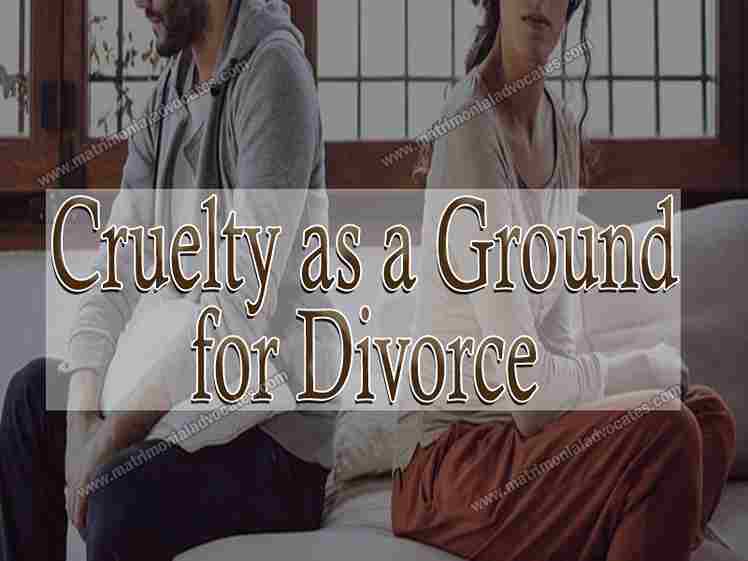
The concept of cruelty as a ground for divorce has no particular legal definition under the laws of India and the same had been done keeping in view that the concept of cruelty cannot have a straight-jacket formula amounting to its dynamic nature and its determination on a case-to-case and person-to-person basis.
It is also essential to realize that what may constitute cruelty as a ground for divorce at an earlier point or present point of time, may not be cruelty in a futuristic perspective. Similarly, something which does not amount to cruelty in the present situation, might in turn amount to cruelty in the future. It is a concept that evolves with the evolution of the society and the societal mindset. Such a view has been reiterated in a plethora of landmark judgments such as in the case of Mohd. Hoshan, A.P. & Anr. vs. State of A.P [(2002) 7 SCC 414] holding that:
“Whether one spouse has been guilty of cruelty to the other is essentially a question of fact. The impact of complaints, accusations or taunts on a person amounting to cruelty depends on various factors like the sensitivity of the individual victim concerned, the social background, the environment, education etc. Further, mental cruelty varies from person to person depending on the intensity of sensitivity and the degree of courage or endurance to withstand such mental cruelty. In other words, each case has to be decided on its own facts to decide whether the mental cruelty was established or not.”
Cruelty in light of it being a ground for divorce may take up various forms such as, physical or mental, direct or indirect, intended or unintended and in all such cases another element that comes into play is the determination of the mental and physical conditions of the parties and the quality and length of their married life etc. There is a major differentiating factor when it comes to acts of cruelty and acts that may occur during the normal and ordinary wear and tear of marriage.
Tracing the history of cruelty as a ground for divorce, prior to 1976, cruelty was merely a ground to seek judicial separation and not divorce under a few personal laws. Further, the definition of cruelty, prior to the amendment was confined to acts of cruelty of such nature so as to cause reasonable apprehension in the mind of the petitioner that it will be harmful or injurious for the petitioner to live with the other party. However, with the subsequent amendment such a conditional nature of the concept of cruelty was removed and the ambit of what amounts to cruelty was widened.
Following are few of the examples as to events and acts that have been considered as cruelty as a ground for divorce by the Court of Law:-
1. Act of physically beating either of the spouses. (Suraj Prakash Katyal v. Santosh, (1979) 15 DLT 30.)
2. Indifference towards the health of the spouse. (Rajender Singh v. Tarawati, AIR 1980 Del 213)
3. Either Spouse’s close connection with another person. (Parihar v. Parihar, AIR 1978 Raj 140)
4. Husband disputing the paternity of the child without substantiating the same during trial. (Chiranjeevi v. Lavanya, AIR 2006 A.P. 269)
5. Refusal to have sexual intercourse without any reasonable cause. (Shakuntala v. Om Prakash, (1981) 1 DMC 25.
6. Impotency of husband. (Sirajmohmedkhan v. Hafizunisa, AIR, 1981 SC 1972); Srikant v. Anuradha, AIR 1980 Kant 8)
7. False cases and complaints against either of the spouse.
8. Refusal to have kids. (K. Bhavani v. K. Lakshmana Swamy. (1995 CrLJ 1827 (A.P))
9. Dowry demands by husband and his relatives. (Shobha Rani v. Madhukar Reddi, AIR 1988 SC 121)
Cruelty has both civil and criminal remedies. The difference between the two is such that whereas the civil remedy is available for both the spouses, the criminal remedy is only available to the wife as given under Section 498A of the Indian Penal Code, 1806.
Going through Matrimonial Issues! Need legal advice on 498A,
Divorce, Child Custody, Domestic Violence. We are providing a niche platform
for knowledge sharing, researching and finding an Advocate for a person who is
facing litigation and gives solution for all your legal queries. MatrimonialAdvocates.Com has expert divorce
lawyers across the country.
Disclaimer: These articles are providing only general information regarding Indian Laws and should not be construed as legal advice on any subject matter. Please speak to an Advocate to discuss your specific case.





